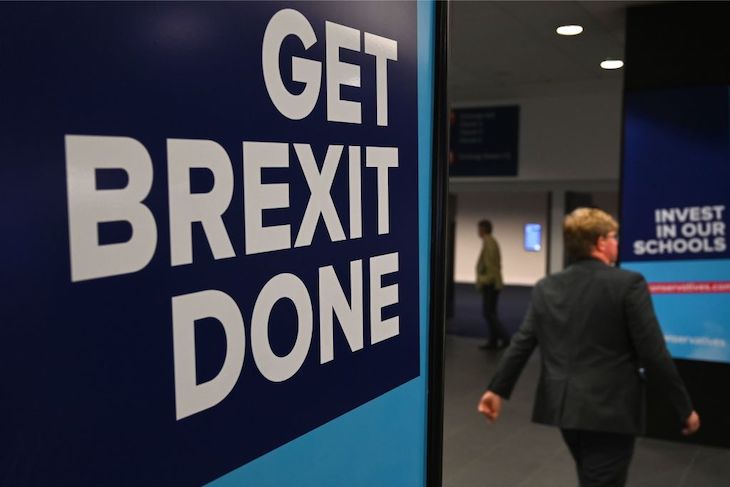I can’t say I like it much, but the slogan for the Conservative Party conference in Manchester is a work of political genius: ‘Get Brexit done: invest in our NHS, schools and police’. In ten words, it offers a simplicity and clarity of intent that none of those who stand opposed to Boris Johnson have yet summoned up.
Arguably, that slogan captures something that could even be described as the missing centre-ground in British politics: socially conservative (Brexit as reassertion of the nation state and the rejection of liberal internationalism) and economically liberal (Spend! Spend! Spend on the strong state!). If – big if – the Conservatives fight a general under that banner, my money would be on them to win.
On the way to Manchester at the weekend, I spent some time with friends from far, far outside the bubble that has temporarily relocated from Westminster to Manchester for a few days. There’s no need for me to identify them further, beyond saying these are the people who told me in April 2015 that David Cameron would beat Ed Miliband (‘He seems a bit odd’), in 2016 that Britain would vote to Leave (‘There’s a lot of people up here who want rid of the lot of them’) and in 2017 that Theresa May would not capture many Labour Leavers (‘There’s never going to be much support for Tories here’).
Their verdict on current politics and in particular that Tory slogan? ‘Get Brexit done? Sounds fair enough. A lot of people want to just get on with it.’
But but but, I quibbled, it’s not that simple. First, Brexit will never be done: we will always be debating and assessing our evolving relationship with the European Union, since it will be our biggest economic and strategic interlocutor, not to mention our nearest neighbour. Brexit is forever; it will never be ‘done’.
Second, that ongoing European focus will be magnified enormously if we fall out of the EU without a deal. We’ll still need a permanent formal trade agreement with our biggest trading partners, which means sooner or later Britain will be back negotiating with the EU27 and the Commission, and the starting point for those talks will be: pay your membership fees; protect our nationals’ rights; and answer the Irish border question.
This should be the weak spot for Boris Johnson’s Brexit positioning. His opponents, instead of fixating on Westminster process and language, or making doom-laden predictions of economic harm from a bad Brexit, should ask him, again and again and again: What next? After you ‘get Brexit done’, what will our relationship with the EU be? What next?
I say should but my amateur focus grouping makes me wonder if even that approach would be adequate. As I explained to my friends about the endless maze that is Brexit, I had a familiar feeling. It’s the feeling I had when I explained in 2015 that the electoral numbers were stacked heavily against David Cameron, that even senior Tories didn’t really think they could win a majority. The feeling I had in 2016 when I pointed out the polls were still firmly in favour of a Remain vote and that for all the failings of the Remain campaign, we were still odds-on to stay in. And the feeling I had in 2017 when I asked, surely people aren’t going to vote for Jeremy Corbyn, are they?
In short, a feeling that makes me ponder that simple promise to Get Brexit Done, and conclude that it has power, more power than us smug, clever types who obsess about details and facts naturally recognise. My central conclusion about the future of British politics and government is that as long as Boris Johnson and the Conservatives stick with those ten words, sooner or later these two things will happen, in no particular order: Britain will leave the EU, probably without a deal; and the Conservatives will be the largest party at a general election.
Is there a way to counter the power of those ten words? I have no view on the party political aspect of this; my interest is in the Brexit dimension. I voted Remain but I think we have to leave, for no more complicated reason than we voted for it; failing to leave would incurably poison our already toxic politics. But I’m as opposed to no deal as I am to no Brexit.
And as an opponent of no deal, what worries me is that the political forces committed to averting that outcome haven’t really managed to assemble an effective political message to counter that simple, effective message from the Johnson team. Yes, I know they’ve passed the Benn Act that might well push our exit date back from 31st October to perhaps 31st January.
But passing a law to extend Article 50 is not winning this argument. Winning a tactical skirmish in Parliament is not winning the strategic contest. And the last three months have shown that Dominic Cummings is a poor tactician but a good strategist: his organisation remains clearly focused on a defined objective, well-understood by all. What do those who oppose him want? To Remain? To leave with a deal? To hold another referendum, on a question yet to be determined?
Confronted with a choice between simplicity and confusion, clarity and indecision, it would be unsurprising if many voters find those ten words persuasive and so licence Johnson to do as he wishes. If Britain does fall out of the EU without a deal, something I think remains quite likely, it will be because of those choices, and the power of those ten words.







Comments